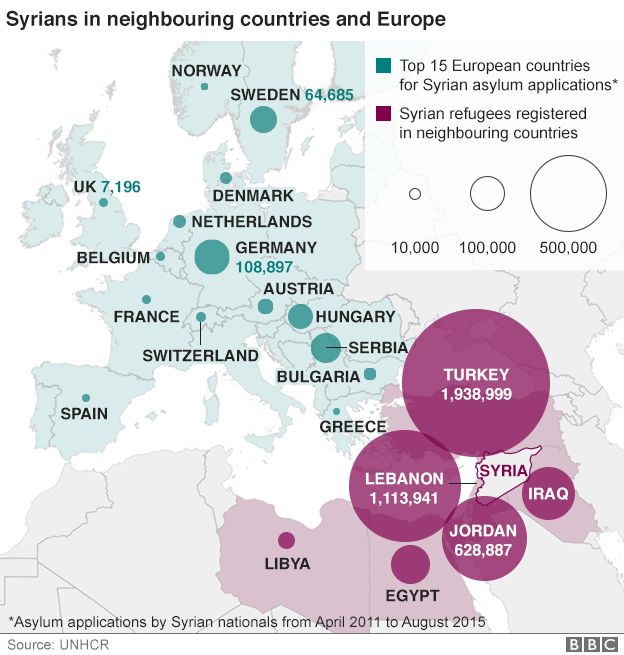Migrant crisis: EU approves Turkey action plan
 EU leaders hope a deal with Turkey will lessen the flow of migrants on to the continent
EU leaders hope a deal with Turkey will lessen the flow of migrants on to the continent
EU states have approve an action plan for Turkey that it is hoped will ease the flow of migrants to Europe.
Nearly 600,000 migrants have reached the EU by sea so far this year, many of them travelling from Turkey to Greece before seeking to head north.
Turkey made a number of demands in exchange for helping to stem the flow.
In a press conference in Brussels, Donald Tusk, the president of the European Council, said he felt "cautious optimism" over the deal.
Reports in Bulgaria said that an Afghan man was shot dead while trying to enter Bulgaria from Turkey late on Thursday.
He was part of a "large group" of migrants trying to enter Bulgaria, AFP reported, quoting the interior ministry.
In the Brussels summit, European officials agreed to:
- an earlier introduction of visa liberalisation for Turks wanting to visit the EU's borderless Schengen area
- new chapters to be opened in Turkey's EU accession negotiations
Turkey had also asked for €3bn (£2.2bn, $3.4bn) in aid, something German Chancellor Angela Merkel said EU states were considering.
Jean-Claude Juncker, the president of the European Commission, said talks over the sum to be given to Ankara would continue with Turkish officials over the coming days.
Mrs Merkel will travel to Turkey at the weekend.
"There is still a huge amount to do," Mrs Merkel said. "But you cannot say that we've achieved nothing."
EU sources had said several countries were cautious about rushing into an agreement with Turkey too quickly.
Among them were Greece, Cyprus and France.
Analysis - Chris Morris, BBC Europe correspondent, Brussels
I think most EU leaders know that, if there is any prospect of bringing the migration crisis under any kind of control, then much closer co-operation with Turkey is absolutely essential.
What we have had in this summit is a tentative agreement to make progress - but it all depends on how well it's actually implemented.
The chairman of this summit, Donald Tusk, said he was very clear that it all depends on whether the flow of refugees into Europe is actually stemmed - and I don't think we are going to know for weeks whether Turkey has the ability to do that.
Read more
The BBC's Matthew Price is sending social media broadcasts from Calais on the EU migration crisis. You can follow his reports here.
The pull of Europe: Five migrant stories
Merkel under pressure: Chancellor's migrant policy faces criticism at home
Focus on Turkey: Why the EU views Syria's northern neighbour as key
Crisis in graphics: Migration numbers explained
Earlier on Thursday, Mrs Merkel said all EU countries must be prepared to send security staff to the bloc's external borders.
She said it would be unfair to ask EU countries seeing the majority of initial migrant entries to secure borders as well.
"It's quite obvious that only a few countries today take the majority of refugees and if these countries now are asked to secure the external borders on top of that, I don't think it would be what we could call a fair distribution of effort," Mrs Merkel said.
She described the current situation as "very disorderly".
In other developments:
- Hungary's Prime Minister Viktor Orban said his country would decide whether to close its border with Croatia on Friday
- EU foreign policy chief Federica Mogherini called for member states to address the causes of migration by providing more money for Syrian refugees in Jordan, Lebanon and Turkey and for development in Africa
- Five members of a Lebanese family have drowned after a boat carrying them from Turkey to Greece capsized, relatives say. Another four are missing.
Migrants arriving in Europe
Turkey is hosting some two million migrants, most of them fleeing the war in neighbouring Syria.
Turkey has also called for the establishment of an international "safe zone" for refugees inside northern Syria - but Mr Tusk said Russia's involvement in Syria made the idea more difficult.
Also in Brussels, the UK Prime Minister David Cameron said he would present four main demands for change in the EU in November. It comes ahead of a promised referendum on the UK's membership of the EU in 2017.
Mr Tusk welcomed Mr Cameron's announcement, adding that the "real negotiations" could start after early November.





